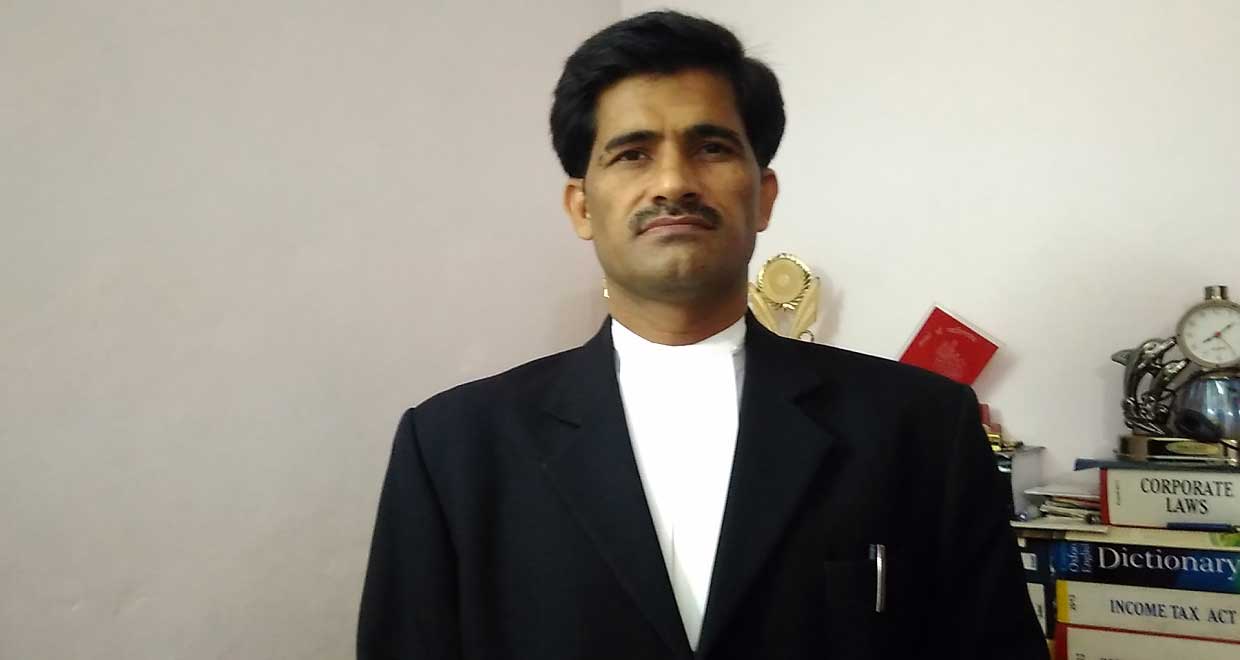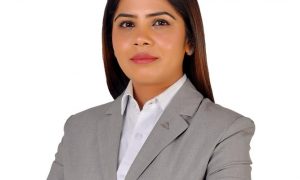Nem Singh graduated from Dharam Samaj College of Agra University in 1996. At present, he is the secretary of Unison Gyan Education Society of Integrity (UGESI). He is a first generation lawyer and has developed a great interest in the area of taxation.
In this interview he talks to us about:
- Importance of taxation as a subject for law students.
- How can one gain expertise in Direct Tax.
- His strategy to deal with errors and mistakes.
- Primary essentials of a Direct Tax lawyer.
Most of our readers are young lawyers and law students. How will you introduce yourself to them?
I belong to a middle class family from Aligarh. We have an agriculturist background. I completed my masters’ degree in Political Science in the year 1993 and thereafter successfully pursued three year degree in law in 1996 from Dharam Samaj College of Agra University, Agra. I got enrolled with the “BAR COUNCIL OF UTTAR PRADESH” in 1997 as a “Trainee” (as per Bar Council of India Rules) in Taxation. I started my professional carrier from Aligarh with Mr. Rahul Pandit and Mr. Sanjay Pandit, Advocates of CB Prasad and Associates, Advocates, a well known name in legal profession in the state of Uttar Pradesh. My family had a permanent panel of Lawyers to look after its Civil, Criminal and Land Revenue matters in district Courts as well as High Court due to many litigations of the family. I, in the course of time had developed during my college studies, some basic knowledge in the field of civil, criminal and revenue laws and its court proceedings.
Since I developed great interest in the area of Taxation as a student of law, I wanted to practice in this area. I shifted to Delhi in July 2003 and joined a firm of Chartered Accountants under the title Mr. Dushyant Tyagi and Associates. Mr. Dushyant Tyagi was Ex-Chairman of NIRC of ICAI and independently handled the matters of high profile corporate clients. I also got associated with Mr. Ajay Wadhawa, Chartered Accountant, then president of ITAT Bar Association, and got opportunity to appear before Income Tax Tribunals which was a great learning. For last four years I have worked with O. P. Bagla & Co., a Chartered Accountants firm, as an Attorney, legal researcher and assisted them in appeals before Income Tax Appellate Tribunal etc.
Dear friends, I was the first generation lawyer with no back ground /support in legal profession. My experience is that, it is very difficult to succeed despite hard work. However, your confidence, knowledge and zeal to work hard will lead you to achieve success if you have patience and determination. You must strive to get justice to your clients for which you must leave no stone unturned.
What brought you into studying law? Was it a fate or plan?
It was my quest for having knowledge in the field of law so that I could help people in my native place and my family to enforce their rights in the legal forums and facilitate their access to justice. So I can say that I had a sort of a plan to pursue law as a professor.
How important is taxation as a subject for law students?
Today, taxation has become an integral part of life due to free trade in global economy and as a major source to augment revenue of the state. It facilitates government to create infrastructure for the society and finance welfare schemes particularly for the needy and poorer sections of the society. This subject must be taught as a compulsory course in the law schools as it is still being taught as an optional subject. Tax laws are very complicated and highly technical and need to be taught by practitioners of tax law. Its interpretation and different judicial precedent create a very difficult situation and unprecedented expansion of law. In coming times each and every global transaction will affect the economic decisions of the state, corporate business houses, Institutions and individual too. It will require rational and simplified legal framework. Its knowledge will explore the exciting and broad field of practice of tax law, nationally as well as internationally.
Which field of law will you advise law students to pursue?
I want to suggest to you to pursue career in civil law fields because it has broader scope and has relevance in the Commerce, Trade and International transactions. By being a civil lawyer, you can practice in a civil court, consumer court, land revenue court, arbitration court and constitutional court and also to join corporations as legal advisor. Tax laws are very highly technical and a specialized field.
How can one gain expertise in Direct Tax? What does it take to be a good direct tax lawyer?
You should understand the basic fundamental of computing taxable income by applying provisions of tax law, circulars, and notification. You should have update knowledge of judicial interpretation, their applicability and must be well versed with the facts of the case you deal with. In taxation, your claim should be based on documentary evidence and generally not on oral evidence. If your case is weak on facts and evidence then law can’t help you. The system of direct taxation as it is known today has been in force in one form and another even from ancient times. Manu, the ancient sage and law giver stated that the king could levy taxes. According to “Shastras”, taxes had to be related with the income and expenditure of the subject. The emphasis has been always on principle of accounting of income and expenditure.
Besides being a good lawyer, you should have the quality of being a person of integrity & honesty. You must be a hard worker, devoted to duty and honest in your practice before the tax administration. Never ignore the fact that you are not a business man, your job is to advise the businessmen to pay taxes as per the law applicable and avail all the permissible deductions and guide them proper tax planning. To succeed as a lawyer, we should try to study the cases property, prepare them to the best of your almighty and argue the cases with confidence. While arguing before a court, your approach should be to carry the court with you and show great respect to it. Whenever possible watch the proceedings in the court to read the mind of the court, learn court craft and etiquettes which are necessary to be a successful lawyer. We should study the action and reaction of the parties and courts to acquire the skills of pursuing the case professionally. You should never be afraid of failure because failure teaches you more in life than success does.
I want to quote here the words of senior stalwart Mr. Fali S Nariman that he learnt a lesson in his life that for a lawyer “it is better to spend more time thinking about a case than merely reading the brief”. He also said that “skill of a practicing lawyer is not flamboyance or verbosity but hard work”. Avoid histrionics and stick to the record, you will find the judge receptive to your pleas”. In the words of senior stalwart Mr. Harish Salve if one wants to be a good lawyer, “You must have the ability and the desire to work long hours with great concentration and enthusiasm. You must keep thinking about the matter and always keep your mind open for fresh ideas. And you must never give up”.
What has been your strategy to deal with errors and mistakes?
There is a quote that a person who never made a mistake never tried anything new i.e. he who never made a mistake, never made a discovery, said Samuel Smiles. If you have recognized any mistake or error in a case you deal with, take it on priority basis and follow the procedure to rectify or correct it. It will prove that you are honest, dedicated, accountable and credible. Dedication and sincerity are the most important attributes that a good professional should have. It is also beneficial for both i.e. you and your clients too especially when you are practicing in the area of taxation law.
What are the preferred legal issues you like to work on? Do you have any hobbies that help you unwind after a long day at work?
There will be no problem for me to tackle or deal with any legal issue that arises before me if I am able to understand the concerned law and the issue involved. In my short of span at the bar, I had to deal with different type of issues through my hard work and conducted research with the help of global digital media. In taxation law, there is vast scope of legal issues because it is directly connected with corporate law, general laws, business, property transfer, contract, registration and criminal laws etc. So to lead a successful professional life, it is necessary to study the case in depth and find from all legal angles relevant latest judicial pronouncements on the issues at hand.
It is my hobby to surf on social and political media, read blogs, make comment or suggestions read judicial decisions of the courts and literature on cultural and religion, examine critical social issues despite long day hard work. This refreshes me and gives me further motivation to excel. I also like to work as a social activist as well.
What would you suggest a fresh law graduate should do to hold spirit and utilize the opportunities available in his first year of graduation?
He must develop the habit of becoming a prolific reader to build his capacities and to begin with, get attached to a good lawyer to know the procedure and practice required to be a successful lawyer in the years to come.
What are the primary essentials of a direct tax lawyer? What is the current scenario of studying direct tax law as a career option in India?
You should be registered with the BAR COUNCIL OF A STATE and have the knowledge of Tax Law and accountancy. Studying direct tax law offers you great opportunity of work with big legal corporate houses because there is wide scope of practice before assessing authorities in proceedings of assessment, penalty, prosecution and appeal before CIT(A), ITAT, High Court and the Supreme Court in corporate tax, international tax, transfer pricing etc.
What would be your parting message for readers?
This profession is to protect the right of the people and to give them correct legal opinion/advise. You must give your professional service to the best of your ability and get you professional charges commensurate with your hard work. I want to remind here the Shlok of Bhagavad Geeta Chapter-II, Verse-47:
“Karmanye Vaadhikaraste, Maa Phaleshu Kadachana;
Maa karmaphalaheturbhooh, MaTe sangostwakarmani.”
Further God is the creator of everyone and we should do our best to serve the people. It gives a strong base to connect with larger section of people of the world and this should be our aim. I am also reminded of a great saint Tulasi’s Ramcharit Manas Chopai:
“Karm pradhan vishva kari rakha, Jo jas karye so tas phal chakha,
Hoi hai soi jo Ram rachi rakha, ko kari tarak badhave shakha.”
One must always have positive attitude towards things and be optimistic. We should not stop thinking of how a new approach or a new angle can make the difference. We should read the book of English Jurist Mr. Edward Abbott Parry’s “Seven Lamps of Advocacy” which are: (1) The lamp of Honesty, (2) The lamp of Courage, (3) The lamp of Industry, (4) The lamp of Wit, (5) The lamp of Eloquence, (6) The Lamp of Judgment and (7) The lamp of Fellowship.
























